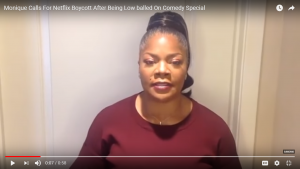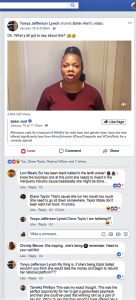We are all valued in society according to our perceived contribution to society. This is the context and the construct of our social use value and it changes sometimes according to what room we’re in and at what time. This factors of social use value and valued contribution affect our pay and how we provide for ourselves and our families. Therefore something so important as what we are paid for our efforts can have a bit of a pop-culture flightiness to it, which can be frustrating and confusing. Intersectionality is such a complex thing because our different categories are constantly placing is on a scale within a matrix of sliding scales that change over time and as popular culture shifts.
Please watch this one minute video and then meet me below in text. The video will open in a new tab. After watching, you will need to switch back over to this tab.
Because of my work as a grass roots organizer, I am always in an echo chamber of calls to action and causes. There’s been a lot of debate within my social circle about the validity of her claim. Many who are black and notably “pro black” are not siding with Monique, saying everything from “she needs to be humble and negotiate her contracts like everyone else or move on” and “the backlash she’s getting from Hollywood is her just due, because of statements she’s made in the past against some Hollywood favorites like Oprah and Tyler Perry”, to citing that “Netflix paid Dave Chappelle and Chris Rock, who are both black, mega millions for their specials”.
I’m not sharing this video for us to debate on the validity of her claim. To me, this speaks to the complicated nature of intersectionality and how it’s not often as simple as it seems when we view it in our curriculum. When we speak about it in our Sociology studies, we say that intersectionality occurs when a person experiences the world through more than one minority identity, like being black and being a female or any other combination of minority categories.
In her case, her contract with Netflix naturally placed her career on a value scale, where it was compared to other comedians and everyone could not get equal contracts. In her negotiations, she was trying to understand the metrics that were being used to construct her place on the scale. She tried factoring her career, where she’s received more honors and recognitions than even Dave Chappelle, who was paid the most by Netflix and obviously has played the Hollywood game very well, shooting his own stock up, by walking away from a $50 mil deal some years ago and totally exiting Hollywood, when his career was at its height. Clearly in both of their cases, their careers are being valued by metrics that go way beyond simple accolades and box office sales, where Monique wins hands down.
I’m including a link below to a Facebook feed. Check it out and watch some of my friends and their friends tackle this issue, with some comedy mixed in.
Warning: Y’all know social media has no chill. I have not read all of these comments and don’t endorse any of the views expressed.

